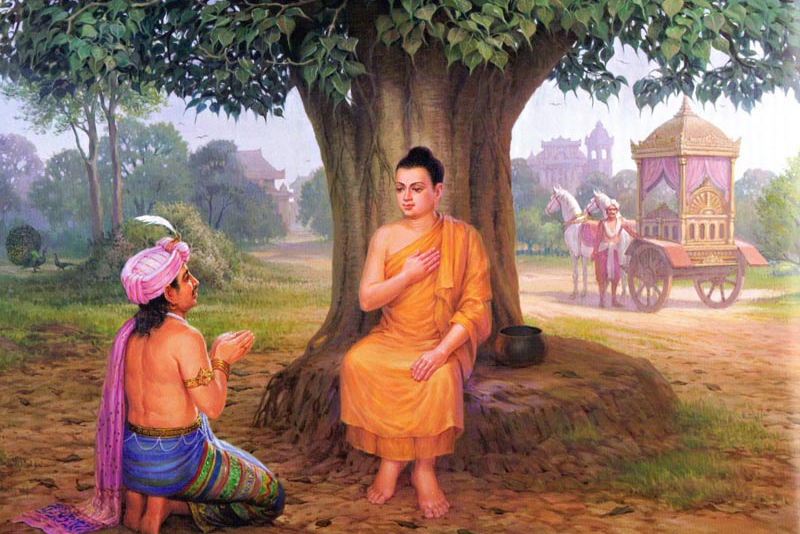One of the Buddha’s friends was King Pasenadi, and there are a number of conversations between them recorded in the suttas. In one of them the king tells the Buddha that when he was on a solitary retreat this thought came to his mind: ‘The teaching is well explained by the Buddha. But it’s for someone with good friends, companions, and associates, not for someone with bad friends, companions, and associates.’
The Buddha replied with obvious enthusiasm, “That’s so true, great king! That’s so true!” He went on to say
Great king, this one time I was staying in the land of the Sakyans where they have a town named Nāgaraka. Then Ānanda came to me, bowed, sat down to one side, and said: ‘Sir, good friends, companions, and associates are half the spiritual life.’
When he had spoken, I said to him: ‘Not so, Ānanda! Not so, Ānanda! Good friends, companions, and associates are the whole of the spiritual life.1
This is a very well known quote within the Triratna Buddhist Community, and it’s perhaps significant that the Buddha remembers it and considers it worth repeating. He also talked, on another occasion, about the happiness that members of the spiritual community enjoy.
Happy indeed we live, friendly amidst the hostile. Amidst hostile men we dwell free from hatred.
Happy indeed we live, friendly amidst the afflicted (by craving). Amidst afflicted men we dwell free from affliction.
Happy indeed we live, free from avarice amidst the avaricious. Amidst the avaricious men we dwell free from avarice.
Happy indeed we live, we who possess nothing. Feeders on joy we shall be, like the Radiant Gods.2
However, the Buddha’s teaching on spiritual community is subtle, and if we’re not attuned to that subtlety, he can appear to contradict himself. Speaking to Ānanda on another occasion, for instance, he warned him against being delighted by ‘company’.
Ānanda, a bhikkhu doesn’t shine who enjoys company and groups, who loves them and likes to enjoy them. It’s simply not possible that such a bhikkhu will get the pleasure of renunciation, the pleasure of seclusion, the pleasure of peace, the pleasure of awakening when they want, without trouble or difficulty.3
How can we reconcile this with his statement that spiritual friendship is the whole of the spiritual life? I think the context gives us a clue. At the time the Buddha happened to be staying in a park just outside a city, he noticed that a large number of bhikkhus seemed to be gathering there too and he asked Ānanda why this was. Ānanda explained that they had gathered together to make their robes,4 and the Buddha responded with this warning. Perhaps then, he was aware that whenever a large number of people got together, even if they were bhikkhus, who had committed their lives to practising the Dharma, there was a tendency for them to lose their self-awareness, their individuality, and he was alerting Ānanda to this danger. Two words the Buddha repeats a number of times in his statement add weight to this supposition: gaṇa, which means ‘a multitude of numbers, a group; a tribe’, and saṅga, which could easily be mistaken for saṅgha (spiritual community), but whichactually means attachment. So I think what the Buddha is warning against here is an attachment to, or dependence on company for its own sake, and using the pleasure that company affords as a distraction from spiritual practice. Once that happens there is no spiritual community, there is a group or tribe.
Returning to the conversation between Pasenadi and the Buddha, it’s interesting that the king was on a solitary retreat when he had the insight that the Dharma ‘is for someone with good friends, companions, and associates’. As Urgyen Sangharakshita once said, you can only be with others in the full sense when you’re able to be with yourself. If you’re unable to tolerate being alone then your relationship with others will be vitiated by your need to distract yourself from the discomfort, or even fear, of solitude.



